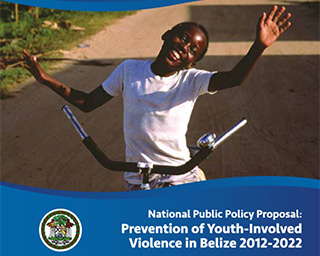Belize: Policy proposals for addressing youth-related violence

In Belize, Interpeace hosted a public presentation of a recent national policy proposal that offers integrated and comprehensive strategies to address the root causes of youth-related violence in Belize. Minister Herman Longsworth from the Belize Ministry of Education, Youth and Sports signed the proposal stating, "This document will serve as a guide to ensure a safe future for Belize's youth and our communities."
An increase in youth violence
Over the last decade, Belize has been confronted by a significant increase in violence - mostly among adolescents and youths. Official statistics show that Belizean youths between the ages of 14 to 24 are getting involved in the illegal drug trade at young ages and dropping out of primary and secondary school at very high rates. As a result, they are over-represented in prison populations and are increasingly the victims of violence. Much of the violence among this age cohort is attributed to drug-related gang violence.
"As the youths are the present and the future of Belizean society, there is widespread recognition that more comprehensive measures need to be taken to ensure that the underlying factors attributing to the rising youth-related violence are addressed," explains Isabel Aguilar Umaña, Director of Interpeace's Central American Youth Programme.
The way forward
The proposal, titled National Public Policy Proposal: Prevention of Youth-Involved Violence in Belize 2012-2022 is based on a collaborative approach that draws from all sectors of Belizean society including the government, civil society and families. It gives a 10-year implementation framework that entails 17 strategies for addressing the underlying factors of youth-related violence. Several of these strategies are already being implemented.
The strategies primarily address education as a means of empowering youths and reducing the vulnerability and marginalization of youths who are most at risk of becoming gang members. It also gives an integrated approach to confronting the risk factors of youths through suggesting initiatives that promote community participation, youth employment, and opportunities for citizen dialogue, education, sports, recreation, and culture. Aside from these prevention-oriented strategies, the proposal states the need for increasing the availability of reintegration and rehabilitation programmes for young people who have already become immersed in the culture of violence.
The policy proposal serves as a tool to guide decision-making among both the Belizean state and civil society as programmes, projects, and interventions are developed and implemented. The contextual framework that takes the voices of young people into account can contribute to the implementation of the policy proposal in a way that best addresses the needs of the impacted youths.
Speaking of public policy proposals completed in Belize, Costa Rica, Nicaragua and Panama, Dr. Juan Daniel Aleman, Secretary General of the Central American Integration System (SICA), said: "The added value of this regional initiative has been the commitment to national and regional policies that target prevention."
